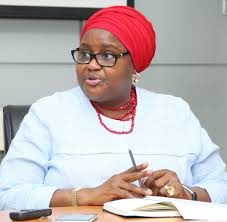Micro Pension Plan Guaranteeing Secured Future Through Steady Income

Mrs. Aisha Dahir-Umar, PenCom DG
There comes a time in a person’s life circle, when the individual can no longer be fit for active economic activities or earning regular income through work. It is a period of rest, for those who have planned for it or their employers have planned for it for them. It can also be a period of poverty and destitution for those who have failed to plan for it.
Organisations plan for their employees’ old age by putting in place pension schemes for them. Pension is a regular income received by a person at retirement when he/she stops working either as a result of haven reached a certain age or based on health condition in order to cater for his/her needs at old age.
The Pension Reform Act (PRA) 2014 was enacted to make provision for a uniform Contributory Pension Scheme (CPS) for the public and private sectors in Nigeria; and for related matters. Section 1 of the Act, states the objectives of the Act as follows: (a) establish a uniform set of rules, regulations and standards for administration and payments of retirement benefits for the Public Service of the Federation, the Public Service of the Federal Capital Territory, the Public Service of the State Governments, Public Service of the Local Government Councils and the Private Sector; (b) make provision for the smooth operations of the Contributory Pension Scheme; (c) ensure that every person who worked in either the Public Service of the Federation, Federal Capital Territory, States and Local Governments or the Private Sector receives his retirement benefits as and when due; and (d) assist improvident individuals by ensuring that they save in order to cater for their livelihood during old age.
Director, Centre For Pension Right Advocacy, Ivo Takor, in a paper “Pension Reform Act 2014 Provision For The Extension Of The Contributory Pension Scheme To Lawyers, Other Self Employed Professionals And Workers In The Informal Sector,” at the 62nd Annual General Conference of the Nigerian Bar Association in Lagos recently, said the CPS, is mandatory for employees of the public service and employees of private sector Organisations with more than three (3) employees. This leaves a vast majority of employees in Organisations with less than three (3) employees and the self employed, including professionals such as lawyers who have no formal financial protection in their old age. In order to expand the coverage of the CPS to these segment of citizens, the National Pension Commission (PenCom), relying on the provisions of Section 2(3) of (PRA 2014) under application of the Act, which provides that notwithstanding the provisions of subsection (2) of this section, employees of organisations with less than three employees as well as self-employed persons shall be entitled to participate under the scheme in accordance with guide lines issued by the Commission, to introduce the Micro Pension Plan (MPP), a special pension plan within the framework of the CPS.
The MPP allows citizens who fall within the bracket earlier mentioned, to make financial contribution towards the provision of pension at their retirement or incapacitation on health grounds. MPP therefore guarantees secured future through steady income at retirement, thereby reducing old age poverty/destitution. The process is easy, simple and flexible to enable it accommodate the peculiar working conditions of the individual.
The Informal Sector constitutes a large and persistent scale in any economy, especially in Africa. In Nigeria, over 80% of the working population falls under the informal sector. Informal sector workers are heterogeneous in nature because the sector employs a wide range of individuals, ranging from wage earners and self-employed to domestic workers. They are often characterized with irregular income and lack long-term saving culture.
However, there is absence of social safety nets that can provide better future/retirement plan for the informal sector workers.
Thus, without an urgent and effective policy as well as regulatory response to large-scale pension exclusion of the informal sector worker, poverty among the future elderly could become the dominant cause of increased poverty in Nigeria.
A policy response is the introduction of the Micro Pension Plan (MPP) to ensure that informal sector workers have an opportunity to save for their retirement.
The Micro Pension Plan (MPP) is a long-term voluntary financial plan for the provision of pension coverage to the self-employed, and persons working for organisations with less than 3 employees who are mainly in the informal sector.
It means that accountants, architects, lawyers, artisans, traders, stylists, farmers, commercial drivers and more can contribute for their pension.
Speaking on the topic “The Micro Pension Plan: Bringing Financial Security at Old Age to the Doorsteps of the Informal Sector” at the workshop organized by PenCom for journalists in Lagos, Dauda Ahmed Head, Micro Pensions Department of PenCom listed the benefits of Micro Pension Plan which according to him is to improve the standard of living of the elderly as it provides a regular stream of benefits at old age; provide access to other incentives as well as secures financial autonomy and independence of retirees.
He said the Contributions will be passed to the next of kin in case of contributor’s death
Dauda on the features of the Micro Pension Plan, said the plan is a voluntary plan as informal sector workers are not mandated to participate
The plan accepts minimal requirements for registration – NIN, membership of association/union, with or without formal employment contract.
Those who are 18 years and above are eligible to register and they can register with any Pension Fund Administrator (PFA) of their choice
Contributions: Flexible – daily, weekly, monthly or at the contributor’s convenience. The plan accepts the use of multi-channel platforms e.g. mobile money payment, cash deposit or funds transfer.
In putting the scheme in place, PenCom took into consideration the widely dispersed nature and generally low and irregular incomes of self employed persons including professionals and workers in the informal sector, to provide for a pension plan that would meet their special characteristics. In this regard, the MPP initiative has been conceived within the context of an industry wide strategy to bring this class of workers on board the CPS.
In implementing this initiative, the informal sector has been segmented into three broad categories. The low income earners, the high income earners and the Small Medium Enterprises (SMEs). Each of these categories is targeted with appropriate pension products and sensitization programmes that meet their peculiarities.
PenCom along with Pension Fund Administrators (PFAs) who are administering the MPP have put in place a robust technological platform that supports the provision of customer services is necessary through effective and efficient registering, collections of contributions, provide Retirement Savings Account support, pay benefits and provide financial advisory services to this class of workers. In addition, a Department has been established in the Commission to drive the implementation of the Micro Pension Plan.
Lawyers offer people a sense of comfort when following their life goals believing that if they need help, someone will have their back. Among the several roles of lawyers, lawyers also give their clients advice and attend to legal matters outside the courtroom realm, for cases such as business legal service, family and divorce cases and recommend business and personal course of action including clients welfare.
The outgoing National Executive Committee of the Nigerian Bar Association (NBA) led by Olumide Akpata as President, has through some of the policies they have put in place shown that the welfare of lawyers is very important and have indeed taken it a notch higher than what they met, which is a very welcome development. It is common knowledge that there are very rich or aristocratic lawyers and those who may be considered poor lawyers in Nigeria today. This situation is based on a number of factors. However, any circle is as strong as its weakest link. Lawyers who may be classified as near destitute in their old age cannot be a pride to our noble profession.
As we gather for the 62nd Annual General Conference of the Nigerian Bar Association, to in the words of Ikechukwu Uwanna, Chairman, Local Organising Committee 2022 NBA AGC “to interrogate topical legal issues, review the state of our dear nation, network and take the very needed rest from rigours of legal practice”, let’s spare time to reflect on what our old age or the old age of our employees or associates will be. Will it be a life of destitution or of a well-planned rest?
In the same way and manner we give necessary comfort to our clients when they are following their life goals through our professional services to them, let us have our backs or the backs of our employees or whatever beautiful nomenclatures they are given by embracing or assisting them to embrace the Micro Pension Plan under the Contributory Pension Scheme established by the Pension Reform Act 20014. You can get more information from the websites of the National Pension Commission (PenCom) or any of the Pension Fund Administrators (PFAs).





